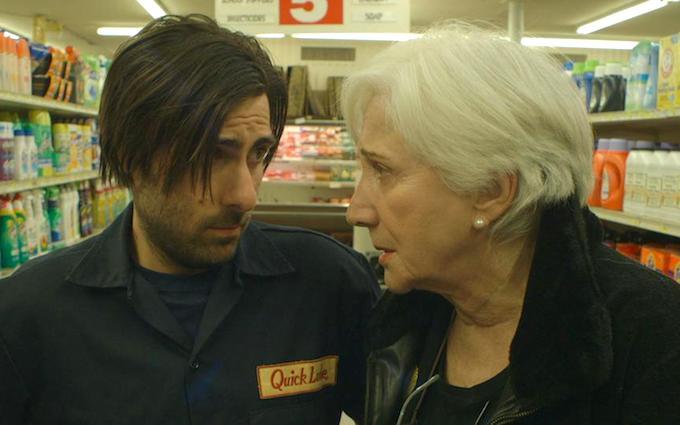 Lest the title of “7 Chinese Brothers” inspire visions of the next ensemble crime drama from Johnnie To, the film in question is a quietly acerbic, absurdist oddity featuring Jason Schwartzman and his bulldog Arrow. The two are co-stars and compatriots driving around Austin, Texas in a filthy car having one-sided conversations while the rest of the world belittles and bypasses them both. This could change, but Schwartzman’s character Larry might need more than the film’s brisk 76-minute runtime to convince him of such a possibility.
Lest the title of “7 Chinese Brothers” inspire visions of the next ensemble crime drama from Johnnie To, the film in question is a quietly acerbic, absurdist oddity featuring Jason Schwartzman and his bulldog Arrow. The two are co-stars and compatriots driving around Austin, Texas in a filthy car having one-sided conversations while the rest of the world belittles and bypasses them both. This could change, but Schwartzman’s character Larry might need more than the film’s brisk 76-minute runtime to convince him of such a possibility.
Directing by Bob Byington (“Somebody Up There Likes Me”), the film is a symbiotic roll calls of the current independent film scene: Alex Karpovsky (“Girls”), Stephen Root, Jennifer Prediger and Alex Ross Perry all show up in supporting and cameo roles. In terms of tone, the picture shares the briefest of crossovers with Perry’s “Listen Up Philip,” casting Schwartzman in a role defined by selfish rage. It never reaches the heights of deplorable behavior Perry’s film’s, but since Schwartzman’s character spends his days keying his boss’ car for getting fired from his job, imitating an overweight child exiting a pool at the interview of the next, and crushing on his boss Lupe (Eleanore Pienta) after he’s actually employed at Quick Lube, it’s not far behind.

Byington has pointed to the 1984 REM song of the title as a thematic guide for the film, with greed, friendship, and love roiling together. But the director cloaks those ideas in a collection of surreal avenues populated by fallible eccentrics. Larry travels daily to see his grandma (Olympia Dukakis) at an assisted-living center where his best friend Major Norwood (Tunde Adebimpe) also works. That particular dynamic shifts once Norwood finds a returned attraction to Lupe. Meanwhile, Larry’s barely competent work at the garage and incoming revenge from his vandalized boss slowly picks away at his psyche.

Schwartzman is the fulcrum element in the film, highlighting a tried-but-true blend of low-key delivery, disarming comic timing and fits of impotent anger that he’s perfected. Trapped in a constant state of reaction to the world around him, he chooses to aim for light entertainment: he regales Arrow with discussion regarding phenomenon of French speakers peppering their phrases with English words, or immediately heads to the George W. Bush library joke (for the curious) in a moment of downtime.
Streamlined by a waltzy organ score by Vampire Weekend’s Chris Baio and made with an incredibly light touch, the film drifts by comfortably, deceptively setting up its characters and situations so as to seem dashed off and inconsequential. But in light of certain films finding wacky characters bobbing around on a seemingly improvised plot, this is a much more assured, technically sound and enjoyable film. Even when its characters try to hurt one another —in this case a plot to incapacitate Arrow and destroy Larry’s house— the plan quickly turns to pissing on Larry’s bathroom floor and writing “FAT” on a framed picture of Arrow.

This tone proves prohibitive in the final third of the film, as hard truths cause Larry to clear out his lifestyle and search for a more sustainable future. Major Norwood falls into the fold much more prominently, but Adebimpe’s stolid performance clicks awkwardly with Schwartzman’s —we never get inside his head in any valuable way, only hearing what he says to Larry. Similarly, Byington establishes Pienta’s dynamic but then cuts more to Arrow’s admittedly cute reactions.
In fact, Arrow will probably be the breakout star of the film, in a similar manner to Ulysses in “Inside Llewyn Davis.” . Otherwise, “7 Chinese Brothers” recalls more of the illogical episodes in Quentin Dupieux’s work, and while it conjures up a winning swirl of themes, lines and images as it unfurls, one suspects that Schwartzman’s considerable talents are compensating for some core deficiencies. [B-]
Browse through all our coverage of the 2015 SXSW Film Festival by clicking here.


